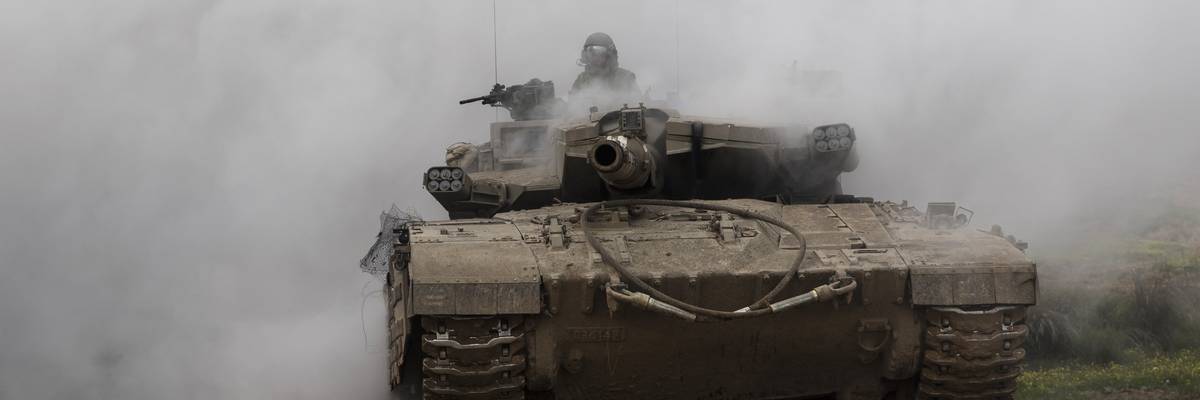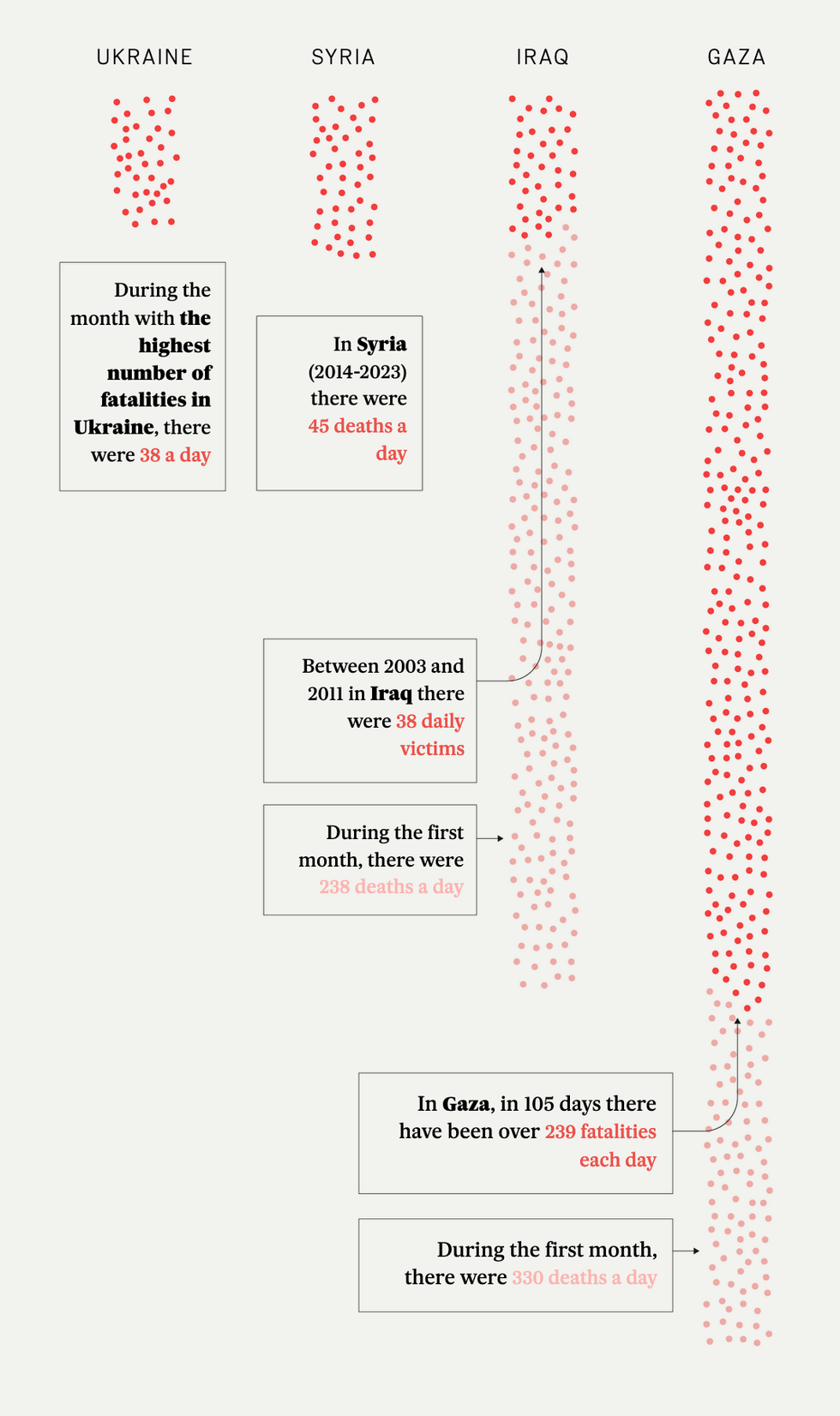

SUBSCRIBE TO OUR FREE NEWSLETTER
Daily news & progressive opinion—funded by the people, not the corporations—delivered straight to your inbox.
5
#000000
#FFFFFF
To donate by check, phone, or other method, see our More Ways to Give page.


Daily news & progressive opinion—funded by the people, not the corporations—delivered straight to your inbox.

An Israeli tank moves along the border structure near the Gaza Strip on January 17, 2024.
An analyst at the International Crisis Group called the deadly incident "a huge catastrophe for Israel that one can only hope will expedite a cease-fire."
At least 21 Israeli soldiers were killed Monday after explosives planted by the Israel Defense Forces in two Gaza buildings detonated, causing the structures to collapse.
The explosion was apparently triggered by a rocket-propelled grenade attack on a nearby Israeli tank. Daniel Hagari, an IDF spokesperson, acknowledged during a televised statement that "the buildings probably exploded because of the mines that our forces laid there, in preparation to demolish them and the infrastructure around."
Hagari said that most of the soldiers killed in the incident were inside or close to the buildings when the mines went off.
Since October 7, Israeli forces have engaged in large-scale destruction of Gaza's infrastructure, including homes and other civilian buildings—the targeting of which is a war crime. Israeli soldiers have gleefully filmed the obliteration of entire Gaza neighborhoods, footage that South Africa played during its presentation at the International Court of Justice earlier this month.
Last week, the IDF used mines to blow up a university in northern Gaza, drawing international outrage.
Monday's explosion contributed to the deadliest day for Israeli forces since their latest assault on the Gaza Strip began three and a half months ago, with 24 IDF soldiers killed. Meanwhile, an average of 239 Gazans have been killed each day by Israeli forces since October 7, when Hamas launched a deadly attack on southern Israel.
"It is difficult to find similar numbers in other recent conflicts," El País reported Monday. "The available data, compiled by the United Nations in the academic project Cost of War, indicate that more people are dying per day in Gaza than in Iraq (even in the worst month of fighting in that country), in Syria, or in the first month of war in Ukraine."

Mairav Zonszein, senior Israel analyst at the International Crisis Group, called Monday's explosion "a huge catastrophe for Israel that one can only hope will expedite a cease-fire."
But Israeli Prime Minister Benjamin Netanyahu signaled on social media that the assault on Gaza, which has been carried out with diplomatic and military support from the U.S., will continue indefinitely.
"The IDF has launched an investigation into the disaster," Netanyahu wrote early Tuesday. "We must draw the necessary lessons and do everything to preserve the lives of our warriors. In the name of our heroes, for the sake of our lives, we will not stop fighting until absolute victory."
Dear Common Dreams reader, The U.S. is on a fast track to authoritarianism like nothing I've ever seen. Meanwhile, corporate news outlets are utterly capitulating to Trump, twisting their coverage to avoid drawing his ire while lining up to stuff cash in his pockets. That's why I believe that Common Dreams is doing the best and most consequential reporting that we've ever done. Our small but mighty team is a progressive reporting powerhouse, covering the news every day that the corporate media never will. Our mission has always been simple: To inform. To inspire. And to ignite change for the common good. Now here's the key piece that I want all our readers to understand: None of this would be possible without your financial support. That's not just some fundraising cliche. It's the absolute and literal truth. We don't accept corporate advertising and never will. We don't have a paywall because we don't think people should be blocked from critical news based on their ability to pay. Everything we do is funded by the donations of readers like you. Will you donate now to help power the nonprofit, independent reporting of Common Dreams? Thank you for being a vital member of our community. Together, we can keep independent journalism alive when it’s needed most. - Craig Brown, Co-founder |
At least 21 Israeli soldiers were killed Monday after explosives planted by the Israel Defense Forces in two Gaza buildings detonated, causing the structures to collapse.
The explosion was apparently triggered by a rocket-propelled grenade attack on a nearby Israeli tank. Daniel Hagari, an IDF spokesperson, acknowledged during a televised statement that "the buildings probably exploded because of the mines that our forces laid there, in preparation to demolish them and the infrastructure around."
Hagari said that most of the soldiers killed in the incident were inside or close to the buildings when the mines went off.
Since October 7, Israeli forces have engaged in large-scale destruction of Gaza's infrastructure, including homes and other civilian buildings—the targeting of which is a war crime. Israeli soldiers have gleefully filmed the obliteration of entire Gaza neighborhoods, footage that South Africa played during its presentation at the International Court of Justice earlier this month.
Last week, the IDF used mines to blow up a university in northern Gaza, drawing international outrage.
Monday's explosion contributed to the deadliest day for Israeli forces since their latest assault on the Gaza Strip began three and a half months ago, with 24 IDF soldiers killed. Meanwhile, an average of 239 Gazans have been killed each day by Israeli forces since October 7, when Hamas launched a deadly attack on southern Israel.
"It is difficult to find similar numbers in other recent conflicts," El País reported Monday. "The available data, compiled by the United Nations in the academic project Cost of War, indicate that more people are dying per day in Gaza than in Iraq (even in the worst month of fighting in that country), in Syria, or in the first month of war in Ukraine."

Mairav Zonszein, senior Israel analyst at the International Crisis Group, called Monday's explosion "a huge catastrophe for Israel that one can only hope will expedite a cease-fire."
But Israeli Prime Minister Benjamin Netanyahu signaled on social media that the assault on Gaza, which has been carried out with diplomatic and military support from the U.S., will continue indefinitely.
"The IDF has launched an investigation into the disaster," Netanyahu wrote early Tuesday. "We must draw the necessary lessons and do everything to preserve the lives of our warriors. In the name of our heroes, for the sake of our lives, we will not stop fighting until absolute victory."
At least 21 Israeli soldiers were killed Monday after explosives planted by the Israel Defense Forces in two Gaza buildings detonated, causing the structures to collapse.
The explosion was apparently triggered by a rocket-propelled grenade attack on a nearby Israeli tank. Daniel Hagari, an IDF spokesperson, acknowledged during a televised statement that "the buildings probably exploded because of the mines that our forces laid there, in preparation to demolish them and the infrastructure around."
Hagari said that most of the soldiers killed in the incident were inside or close to the buildings when the mines went off.
Since October 7, Israeli forces have engaged in large-scale destruction of Gaza's infrastructure, including homes and other civilian buildings—the targeting of which is a war crime. Israeli soldiers have gleefully filmed the obliteration of entire Gaza neighborhoods, footage that South Africa played during its presentation at the International Court of Justice earlier this month.
Last week, the IDF used mines to blow up a university in northern Gaza, drawing international outrage.
Monday's explosion contributed to the deadliest day for Israeli forces since their latest assault on the Gaza Strip began three and a half months ago, with 24 IDF soldiers killed. Meanwhile, an average of 239 Gazans have been killed each day by Israeli forces since October 7, when Hamas launched a deadly attack on southern Israel.
"It is difficult to find similar numbers in other recent conflicts," El País reported Monday. "The available data, compiled by the United Nations in the academic project Cost of War, indicate that more people are dying per day in Gaza than in Iraq (even in the worst month of fighting in that country), in Syria, or in the first month of war in Ukraine."

Mairav Zonszein, senior Israel analyst at the International Crisis Group, called Monday's explosion "a huge catastrophe for Israel that one can only hope will expedite a cease-fire."
But Israeli Prime Minister Benjamin Netanyahu signaled on social media that the assault on Gaza, which has been carried out with diplomatic and military support from the U.S., will continue indefinitely.
"The IDF has launched an investigation into the disaster," Netanyahu wrote early Tuesday. "We must draw the necessary lessons and do everything to preserve the lives of our warriors. In the name of our heroes, for the sake of our lives, we will not stop fighting until absolute victory."